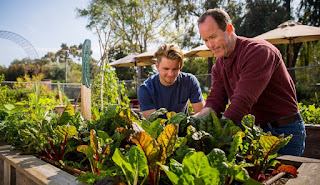Natural, environmentally-friendly living is catching hold among legions of individuals, as is a preference for organic produce. In order for someone to live a holistic lifestyle, and obtain the desired health benefits, they usually have to learn to grow their own herbs and plants. They have to know how to start and maintain an organic garden. If you are interested in growing plants, flowers and vegetables without the use of harmful pesticides and fertilizers, keep reading.
Allow your children to actively participate in planting your organic garden.
The benefits for your children will be a closer bond with nature and an understanding of where food comes from. If you are a fan of organic, sustainable gardening methods, consider leaving part of your backyard untouched so that natural plants and wildlife can flourish in the area. A natural area will allow beneficial birds and insects, many of which pollinate plants, to live on your property and help your garden grow stronger. If you're growing indoor organic plants, you should ensure that you think about how much light is available for them. If you are living in a place that does not have a lot of natural sunlight, think about cultivating plants that do well in lower lighting situations. If you want to grow plants that need a lot of light, consider using artificial lighting. After sprouting occurs, you will not need to keep seeds as warm. You can begin to move them further from the heat source as they become seedlings. Take any plastic film off of your containers because they hold in heat and humidity.
Observe your seeds carefully so that you can make these changes as soon as they start sprouting. Pay attention to how much light your indoor plants are getting. If the garden will receive little sunlight, find plants that can grow in medium or low-light environments. Using UV lamps is a great way to grow an organic garden anywhere. Use approximately two or three inches of natural, organic material as some mulch in every single flower bed. This will prevent weeds from growing, retain humidity, and feed your plants with the nutrients they need. As an added bonus, a nice mulch can help make your garden look more finished. You should work efficiently, instead of working hard in your garden, to simplify things. By having your tools in one location, you will not spend hours looking for them. You can prepare what you need beforehand, keep it all handy in a toolbox or a shed, and you will be ready to work in your garden at a moment's notice. It may be necessary to don a tool belt or cargo pants with extra pockets. You will garden more efficiently if you keep your tools close by. Put them into a basket you carry with you, or use an apron with many pockets and hanging loops. You will be much more productive if you can quickly get to your spade, pruning shears, trowel and watering can. To avoid tracking the mud and dirt that will get on your gardening shoes, use plastic bags.
Having these available lets you keep your flow in movement, and helps you return to your gardening fast so you can finish up your day. Pine mulch can be highly effective under the right conditions. Some plants are highly acidic, and like soil that is acidic too. For these types of plants, pine needles are wonderful for mulching. Cover the plots with pine needles. As the pine needles decay, they'll raise the soil's acidity. Once your seeds have germinated they will not need to be kept as warm as before. Take your plants out of the heat once they start to grow. You can now take off any protective coverings on your plants that were there to shield them from the elements. You need to read the seeds to know the best time to do this. Do you want to kill weeds in a natural way? Take newspapers and layer them for controlling weeds. It is a fact that weeds cannot thrive without light from the sun.
The layers of newspaper will kill the weeds because they no longer receive any sunlight. Newsprint also breaks down well, incorporating itself into the compost. In order to improve its attractiveness, add one mulch layer. As in most things, the more you know about organic gardening, the more successful you will be. The tips here can help.
